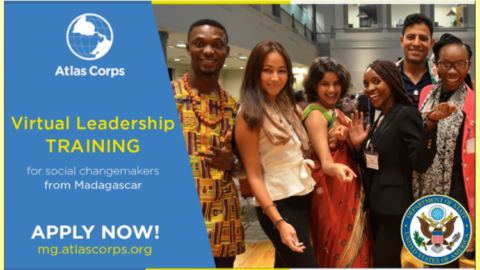Park well! I say park well. Why are you smiling and driving despite being in the car alone! Don’t you know you can cause accident that way! Can I see your driving license? What do you have in your boot? This sounds like the average Nigerian policeman. Last week, the Nigeria Police was in town to enlighten the public on how to report cases of bribery and corruption by its member. In partnership with Cleen Foundation, a non-profit, it went round some cities meeting with community gatekeepers and ordinary citizens explaining to them on how new media technology can be deployed to keep the police on its toes.
Speaking on behalf of the Inspector General of Police, Solomon Arase, the idea behind the project is also to enable Nigerian report crimes and also make immediate report if and when they witness any crime. On www.stopthebribes.net, Nigeria Police hopes to crowd source information and feedback from the public on how its officers are engaging with the public. According to the site – ‘The platform receives complaint through multiple channels namely; phone call, SMS, twitter, Facebook, email and direct reporting onto the website. It promotes inclusive policing by involving members of the public in oversight of the police, thereby engendering public accountability and transparency. Reports on the platform are closely monitored and acted upon by operatives of the Nigeria Police Force responsible for ensuring internal accountability’
I doubt if there is any public institution in Nigeria as mocked as the Nigeria Police and yet they the most important institution when it comes to safety of lives and properties. It is hard finding a Nigerian who believes in the slogan – ‘The Police is your Friend’. Far from it, the average Nigerian is at their mercy since justice is a rarity with them. Innocent Nigerians are reportedly arrested and kept in detention. There are instances of ladies who have been raped by policemen in and out of detention cells. Accidental discharge is a common occurrence. The list is endless. Nevertheless there are still policemen who truly are friends of the public but they are in the minority.
I have often times been forced to ask friends if those cello taped guns of a number of Nigerian Policemen can shoot. One is also compelled to rationalise why the magazines of their guns are painted in the colour of the Nigerian police. Despite the massive explosion of technology, hardly does one find a Nigerian Police Station with a computer at the front desk. Our law enforcement agents are mostly digital have-nots, at least in their official capacity. The day Nigerians begin to meet police officers in public and request for a selfie with them, then change has come. Nigeria’s police stations used to be a safe haven in the 70’s, the West African Examination Council used to keep its question papers in their custody a day before examinations. Nigerians on road trips used to pass nights in police stations knowing they were totally safe from extortion or mischief. That is all past now. For a country under policed and an institution underfunded, it is not a surprise.
The United Nations recommendation is 1 policeman per 400 citizens. Nigeria’s ratio stands at about 1 policeman per 459 citizens; the ratio gets poorer when we factor in about 10,000 policemen that are used to secure the country’s political class and a substantial number of traditional, religious leaders and citizens or private institutions with deep pockets. The United Nations’ recommendation also comes with the assumption that the Police is properly equipped and funded which is not the case in Nigeria. It is a sad memory that the country’s war against terror in Nigeria’s north eastern states was because of how the police mismanaged the situation at its early phase in 2009. If the Nigerian Police have a common room with a television screen, they will be tempted to pat themselves on the back given the outrage against Police officers in the United States in the last two years. It will be a case of ‘we are not alone’.
In an age of digital sophistication, solving crimes has gone beyond the road blocks and check point approach. Mr. Arase who understands the nexus between policing and intelligence will need to know that in today’s modern world, this has to be matched with technology. It is the same tool which has exposed the police inefficiency several times. There are videos on Youtube which were shot by ordinary citizens to document how the Nigeria police operate. Three of them stands out ? one of them is of a police officer negotiating bribe with a supposed traffic offender. Another is that of two police officers fighting in front of a bank while a third one attempts to separate them while the third video is of a police officer dragging a lady in muddy water and threatening to kill her while his colleague watched on.
The Nigeria Security and Civil Defence Corps should not exist if the police was up and doing. The Nigerian Government needs to ‘change’ the Nigerian Police for good. Any institution that does not attract the country’s best eleven stand a risk of being comatose. Until decent young begin to aspire to join the police department can we say Uhuru! www.killedbypolice.net; a project by non-government actors can also be remodel to make our Police department accountable. It aggregates details of killings by the U.S Police. In 2013, it was 768, while in 2014, 1100 citizens were killed by the police; this year, the figure is presently at 530!
@PoliceNG on twitter needs to be used to engage with the public rather than just a news outlet about the activities of the Inspector General. It should tweet and update the public about descriptive information of how to engage police officers at check points. It should make the citizen’s phone more powerful than the policeman’s gun! @bostonpolice is a good reference. Maybe it’s time we began considering getting body cameras for our police officers even though one costs about N200,000 today. That however will be tantamount to putting the cart before the horse.
www.stopthebribes.net will fade off once the public gets the impression that actions are not being taken on complaints posted there. Digital media platforms should be used by the police to extend its community policing efforts. For now, it’s the Nigerian media and citizen journalists occasional shaming of the police that puts errant member of the important institution under check.
@SolaFagro on twitter
—————————————————————————————————————————————-
 ‘Sola Fagorusi is a social entrepreneur and a prized freelance writer with a bias for youth and rural development. He started off as a youth staff with Action Health Incorporated in 2001. The Obafemi Awolowo University, Ile-Ife alumnus currently manages the programmes ofOneLife Initiative, Nigeria. ‘Sola is a DESPLAY Africa (Africa’s foremost and most consistent annual youth democracy academy) fellow and has been on its faculty since 2011. Keenly interested in governance and pan-Africanism, he volunteers as online editor of YouthHub Africa; a cyber-community for young Africans involved in social change. He believes in the efficacy of oratory and writing as tools to drive developmental engagements. As a freelance writer, he spares time to pen thoughts on contemporary societal issues and is a weekly columnist with Nigeria’s most read daily ? Punch Newspaper. His training and capacity cuts across democracy and governance, leadership, micro-enterprise, ICT4D, SRH, value chains, development communication and policy issues. He tweets @SolaFagro and blogs at www.kadunaboy.com
‘Sola Fagorusi is a social entrepreneur and a prized freelance writer with a bias for youth and rural development. He started off as a youth staff with Action Health Incorporated in 2001. The Obafemi Awolowo University, Ile-Ife alumnus currently manages the programmes ofOneLife Initiative, Nigeria. ‘Sola is a DESPLAY Africa (Africa’s foremost and most consistent annual youth democracy academy) fellow and has been on its faculty since 2011. Keenly interested in governance and pan-Africanism, he volunteers as online editor of YouthHub Africa; a cyber-community for young Africans involved in social change. He believes in the efficacy of oratory and writing as tools to drive developmental engagements. As a freelance writer, he spares time to pen thoughts on contemporary societal issues and is a weekly columnist with Nigeria’s most read daily ? Punch Newspaper. His training and capacity cuts across democracy and governance, leadership, micro-enterprise, ICT4D, SRH, value chains, development communication and policy issues. He tweets @SolaFagro and blogs at www.kadunaboy.com






